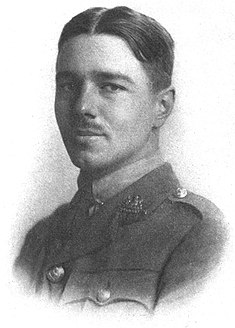
Wilfred Owen Page 2
We found 16 free papers on Wilfred Owen
Essay Examples
Overview
The theme of loss in ‘Disabled’ by Wilfred Owen and ‘Out, out’ by Robert Frost Comparison
Robert Frost Poetry
Wilfred Owen
The verse forms Disabled by Wilfred Owen and ‘Out, out by Robert Frost were written 1917 and 1916 severally, the verse forms were both written with the subject of loss having conspicuously throughout the narrative. Wilfred Owen was an English poet and soldier during the First World War, he was one of the taking poets…
Disabled: Metaphor and Quote
Literature
Poetry
Wilfred Owen
Wilfred Owen wrote a variety of war poetry, these war poems were often illustrating to the audience, the dreadful truth about war. In his poem ‘disabled’ he explored a range of phrases that ensures the audience how war can/does ruin your life, briefly this poem is about a man (soldier) who decides to sign up…
How Does Wilfred Owen Explore the Horror of War Through the Power of Poetry? Analysis
Horror
Poetry
War
Wilfred Owen
Throughout the several poems Wilfred Owen wrote throughout his experience during the First World War, he explores many themes in relation to the war and the emotions associated with these. One of the most prevalent ideas Wilfred Owen chooses to emphasise in many of his poems is that of the sense of horror associated with…
Comparison Between Wilfred Owen’s and Siegfried Sassoon’s Poems
Poem
Wilfred Owen
Wilfred Owen’s ‘Dulce et Decorum Est’ and ‘Anthem for Doomed Youth’ are both poems that protest against and depict the subject of war. They both follow Wilfred Owen’s angst against those who encourage war and the savagery of warfare that he experienced himself. His poetry was devised to strike at the conscience of England during…
Analysis of the Deserter by Winifred M. Letts
Poetry
Sacrifice
Wilfred Owen
Opening Lines Poetry Anthology Section H 1914-18 War (ii) This revision guide is intended to support the work you have been doing in class on the following poems: Recruiting Joining the Colours The Target The Send-Off Spring Offensive The Bohemians Lamentations The Deserter The Hero Falling Leaves In Flander’s Fields The Seed-Merchant’s Son The Parable…
Wilfred owen poems analysis
Poem
Wilfred Owen
Wilfred Owen Poems Analysis20th Century War Poems AnalysisI think that your production of a new book “Anthology for a Warred Youth”, the content it should include is of three sections. The three sections should consist of “Sending Men of to War,” “Horror within War” and “After effects of War”. The five poems you should include…
| born | March 18, 1893, Oswestry, United Kingdom |
|---|---|
| died | November 4, 1918, Sambre-Oise Canal, France |
| genre | War poetry |
| description | Wilfred Edward Salter Owen MC was an English poet and soldier. He was one of the leading poets of the First World War. |
| books | Dulce et Decorum est 1920, Anthem for Doomed Youth 1920, |
| quotations | “Dulce Et Decorum Est. “Red lips are not so red as the stained stones kissed by the English dead.” “And you have fixed my life — however short. “The old Lie:Dulce et decorum est. “All a poet can do today is warn.” “These men are worth your tears. “This book is not about heroes.,I am not concerned with Poetry. The old Lie:Dulce et decorum est Pro patria mori. All the poet can do today is warn. Ambition may be defined as the willingness to receive any number of hits on the nose. If I have to be a soldier I must be a good one, anything else is unthinkable. |
| information | Short biography of Wilfred OwenWilfred Owen was born on 18th March 1893, in Oswestry, Shropshire, England, to Thomas and Harriet Susan Owen. His father worked as a railway clerk and was often away from home, while his mother ran the household. When Wilfred was four, his family moved to Birkenhead, on the Wirral Peninsula, where he attended Birkenhead Institute.Owen’s interest in poetry began at an early age, and he was encouraged by his English teacher, Mr. Simpson. Simpson introduced Owen to the works of Keats and Shelley, and he soon began writing his own poems.In 1911, Owen won a scholarship to Shrewsbury Technical School, where he studied biology and chemistry. He was also a member of the Officer Training Corps.In 1913, Owen left Shrewsbury to study at the University of Liverpool. However, he soon dropped out and enlisted in the Army, serving with the 3rd Battalion, Monmouthshire Regiment.Owen was deployed to France in 1915, and he served at the Battle of the Somme. He was wounded in 1917 and sent to a hospital in Edinburgh, Scotland. It was there that he met the poet Siegfried Sassoon, who encouraged him to continue writing.Owen was sent back to the front in 1918, and he was killed in action on 4th November, just one week before the Armistice. He was 25 years old.Owen’s poems were published posthumously by Sassoon, and he is now considered one of the greatest war poets. General Essay Structure for this Topic
|

